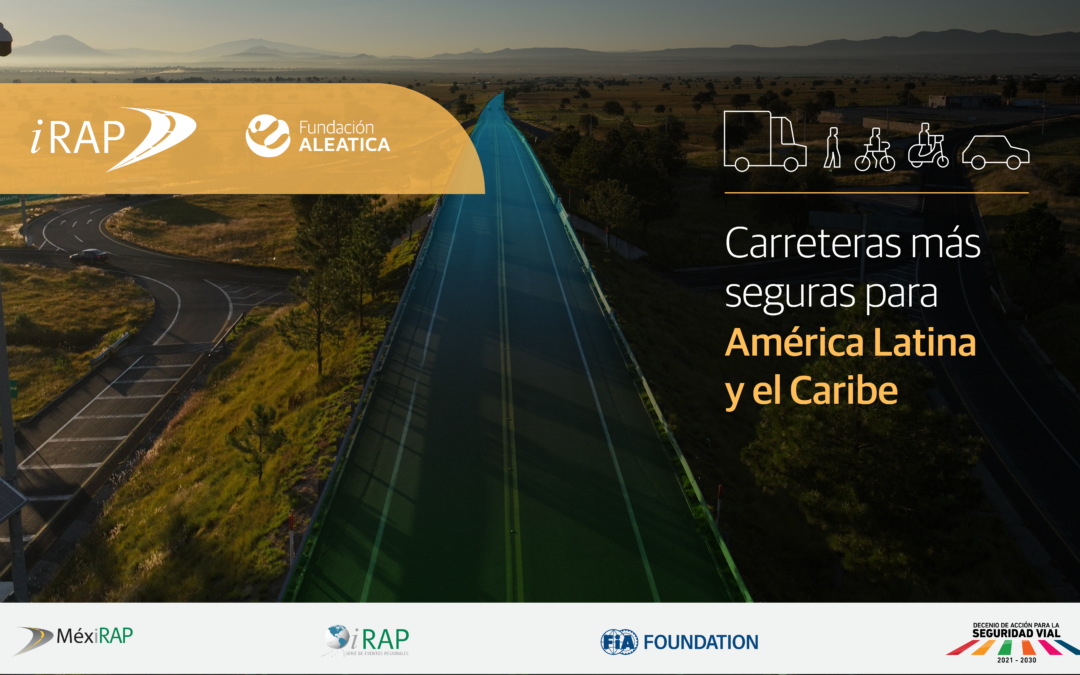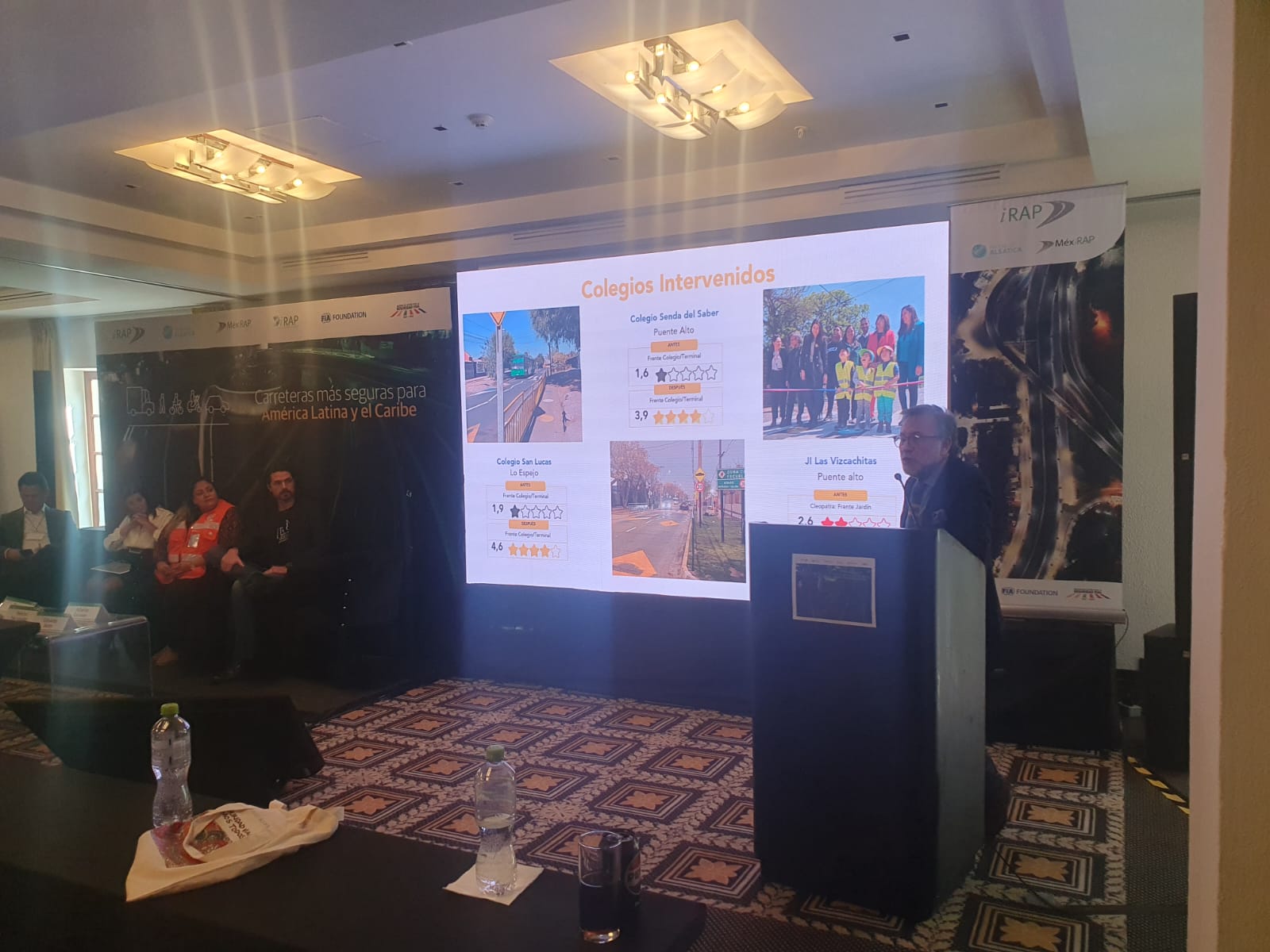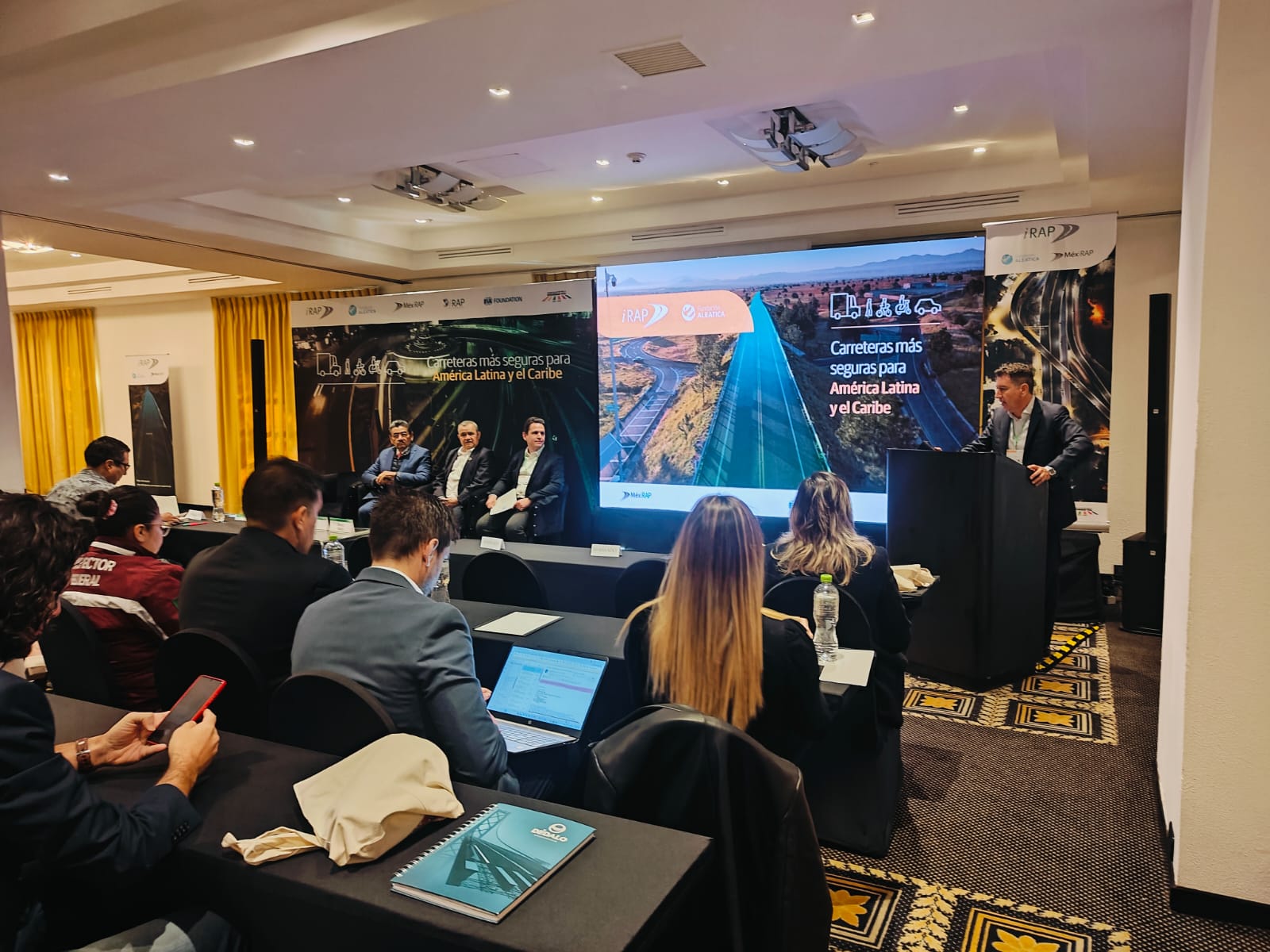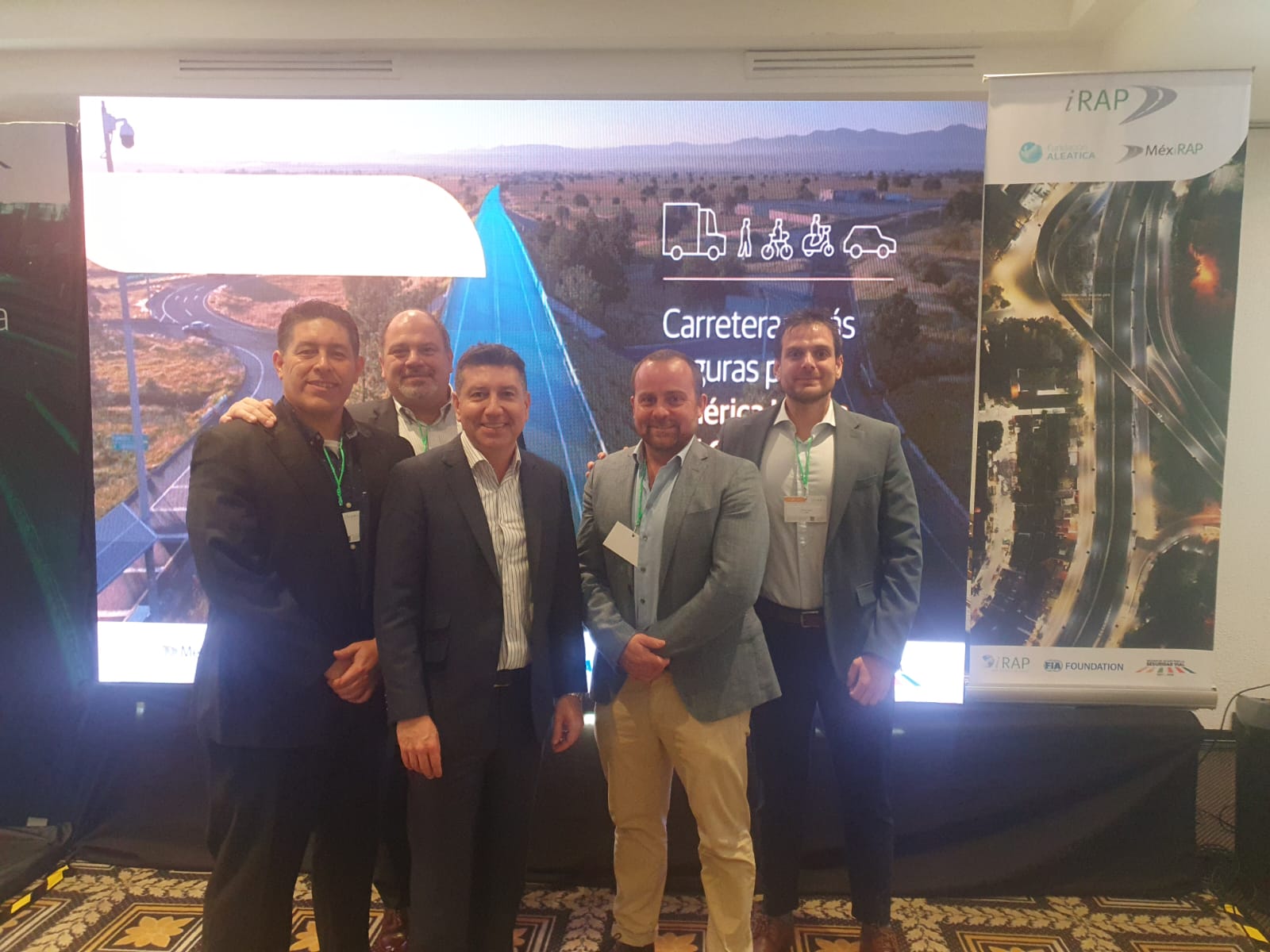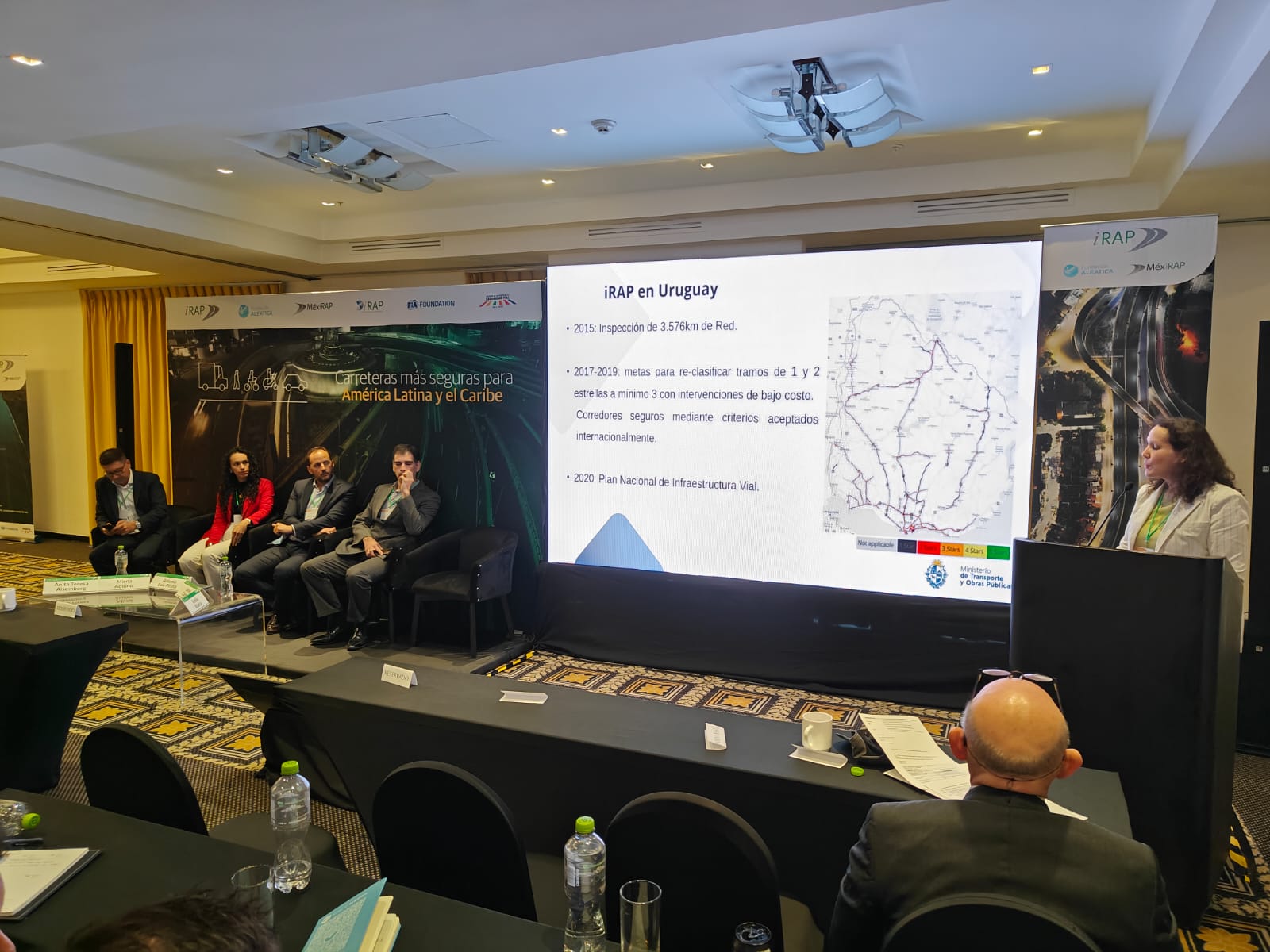With the support of the Aleatica Foundation for Road Safety, around 60 iRAP partners from nine LAC countries came together from 27-28 November in Mexico City, with a focus on “Safer Roads for Latin America and the Caribbean: Saving Lives by 2030”.
Road safety professionals from the public and private sectors, multilateral banking, mobility clubs, research organisations and NGOs joined the high-level interactive dialogue on the challenges and perspectives of the region to achieve the objectives of the Second Decade of Action for Road Safety 2021-2030, focused on the safe infrastructure pillar.
Participating speakers and organisations included Bosco Martí (President of Aleatica Foundation), Marco Frías (Director of Mexican Association of Road Concessions), Juan Manuel Mares (Secretariat of Infrastructure, Communications and Transport of Mexico), José Segundo López (Secretariat of Mobility, Bogota, Colombia), Ricardo Gaviria (Movernos Seguros project), Eduardo Bohn (Thiago de Moraes Foundation), among others.
During the two-day event, safer roads progress and projects across the region were discussed; iRAP tools-utilisation case studies were shared from México, Uruguay, Paraguay, Chile and Brasil; best practice was explored, and the necessary management, prioritisation, design and finance of safe road infrastructure improvements to achieve the 2030 goals.
Useful tools and approaches were presented, including the enhanced Star Rating for Designs Tool, CycleRAP, Star Rating for Schools, the Youth Engagement App (YEA) and AiRAP, highlighting their role in making roads safer in both urban and rural areas.
Many of the speakers shared their experiences in using iRAP tools and methodologies and emphasised their enormous usefulness in guiding more effective road safety investments. Countries such as Chile, Brazil, Colombia and Uruguay have officially adopted these tools and use them to constantly assess the safety of their road networks, school environments or cycle routes.
So far in 24 LAC countries, over 276,000 kilometres of existing roads and designs (including 405 schools) have been Star Rated, helping to inform the safety of US$13 billion of road infrastructure investments. Capacity has been improved in 24 countries through iRAP training and over 50 practitioners are iRAP Accredited. Road safety is being influenced in 30 countries supported by iRAP tools and training.
The event emphasized the critical contribution of iRAP Partners in LAC in implementing the iRAP methodology and tools to inform safer road infrastructure and speeds which have saved over 700,000 lives and prevented serious injuries worldwide since 2016, as reported by Johns Hopkins University.
A big thank you to the Aleatica Foundation for Road Safety for their generous support, and all the participants for contributing to this successful event! Together, we are making critical in-roads in eliminating high-risk roads across the region.
Click here to view the full programme and download presentations available
Opening remarks. Rob McInerney
| Panel 1: Context of road safety in LAC. The importance of data | |
| Date: Wednesday 27 November Time: 9:30 – 10:30 am |
|
| Moderator: Sergio Rodrigo Rosas (ANASEVI) | |
| Topics of interest: Situation of road safety in LAC and challenges to reduce mortality and injuries in the region. The role of the road safety observatories in public policy. | |
| Panelists | Presentations |
| Juan Manuel Mares (SICT, Mexico) | Situation, challenges and trends of the road safety in Mexico |
| Fernanda Espinosa (Aleatica Foundation) | Road Safety Monitor for Mexico |
| Felix Serrano (Ministry of Public Works, El Salvador) | El Salvador’s Road Safety Observatory: challenges and usefulness of data |
| Roy Rojas (COSEVI/OISEVI, Costa Rica) | OISEVI: challenges and opportunities for the region in having an observatory |
| Panel 2: Effective assessments and investments for safer roads | |
| Time: 11:00 – 12:30 am | |
| Moderator: Julio Urzúa (iRAP) | |
| Topics of interest: Importance of road infrastructure safety assessments to guide the effectiveness of investments. Experiences from the public and private sectors | |
| Panelists | Presentations |
| Anita Teresa Aisemberg (Ministry of Public Works, Uruguay) | Uruguay’s road network improvement plan and Star Rating application |
| Mirna Aquino (Ministry of Public Works, Paraguay) | Draft law on road safety audits and inspections |
| Antonio Luis Pinilla (Aleatica) | Private sector experience: Aleatica’s Accident Reduction Plan and application of Star Rating on concessioned roads as a tool to guide investments. |
| Jaime Campos (Ministry of Public Works, Chile) | Road safety assessments in Chile and their impact on road safety investments |
| Panel 3: Innovations in road safety | |
| Time: 12:30 – 13:30 pm | |
| Moderator: Alberto Mendoza (IMT) | |
| Topics of interest: Innovative applications. Use of emerging technologies. Artificial Intelligence. New iRAP developments | |
| Panelists | Presentations |
| Morgan Fletcher (iRAP) | What is iRAP working on for the future? |
| Nadia Gómez (IMT) | Road Safety Research and Development in Mexico |
| Miguel Angel Barranco (road safety consultant) | Intelligent Transport Systems and Road Safety. |
| Victor Medrano (SEMIC) | Application of artificial intelligence for data processing and analysis for road safety. |
| Panel 4: Challenges for Safe Urban Mobility | |
| Time: 15:00 – 16:30 | |
| Moderator: Gonzalo Peón (ITDP, México) | |
| Topics of interest: Safety in urban environments. Transformation of public space for the protection of vulnerable users | |
| Panelists | Presentations |
| Saul Alveano (Secretariat of Mobility, Jalisco, Mexico) | Jalisco’s experience in transforming infrastructure for safe mobility |
| Francisco de Anda (GIZ, Mexico) | Public transport safety |
| Constanza Delon (Secretariat of Mobility, City of Mexico) | Actions for the safety of vulnerable users in Mexico City |
| José Segundo López (Secretariat of Mobility, Bogota, Colombia) | Risk-based speed management: the case of Bogota |
| Special Session: AMCIV’s Commitment to Road Safety | |
| Time: 16:30 – 17:00 | |
| Moderator: Marco Frías (AMCIV) | |
| Topics of Interest: AMCIV’s Commitment to Road Safety | |
| Panelists (in the suggested order) | Presentations |
| Marco Frías (AMCIV) | Road safety commitment of the AMCIV |
| Panel 5: How to close the funding gap for road safety? | |
| Date: Thursday 28 November Time: 9:00 – 10:30 |
|
| Moderator: Bosco Martí (Aleatica Foundation) | |
| Topics of interest: Challenges, opportunities and innovative mechanisms for financing safer infrastructure. Potential of compulsory insurance to compensate victims and repair material damage. | |
| Panelists (in the suggested order) | Presentations |
| Aniceto Huertas (Beel Infrastructure) | PPPs as a financing mechanism for road safety. The role of the private sector. |
| Ricardo Gaviria (Movernos Seguros) | Potential of the insurance industry to fund SA initiatives |
| Julio Urzúa (iRAP) | Experiences of PPPs in Brazil for road safety financing |
| Rob McInerney (iRAP, pre-recorded video) | Australia’s successful experience in road safety funding |
| Panel 6: What are iRAP partners doing for road safety in LAC? | |
| Time: 11:00 – 12:30 | |
| Moderator: Alberto Escobar (Automobile Club, Chile) | |
| Topics of interest: Diverse experiences in road safety work. Lessons learned and challenges of work from civil society. | |
| Panelists | Presentations |
| Fernanda Espinosa (Aleatica Foundation) | Safe Mobility We Are All Project |
| María José Pessano (Gonzalo Rodriguez Foundation) | Child road safety: challenges and progress in LAC |
| Yessica Hernández | Safe school environments in La Tuzania |
| Alberto Escobar (Automobile Club, Chile) | Chile’s Safe School Environment Programme |
| Eduardo Bohn (Thiago Gonzaga Foundation) | Safe Road Programme: Challenges and lessons from an NGO |
| Special Session | |
| Time: 14:00 – 16:00 | |
| Moderator: Edgar Zamora | |
| Topics of Interest: Practical demonstration of iRAP tools for infrastructure security assessment / Importance of managing speed. | |
| Panelists | Presentations |
| Morgan Fletcher | Star Rating Demonstrator |
| Edgar Zamora | Importance of managing speed |
| Agustín Centeno | SR4S Demonstration |
| Franco Azzato | CycleRAP Demonstration |
Aleatica signs #PledgeforSaferRoads and celebrates global certifications
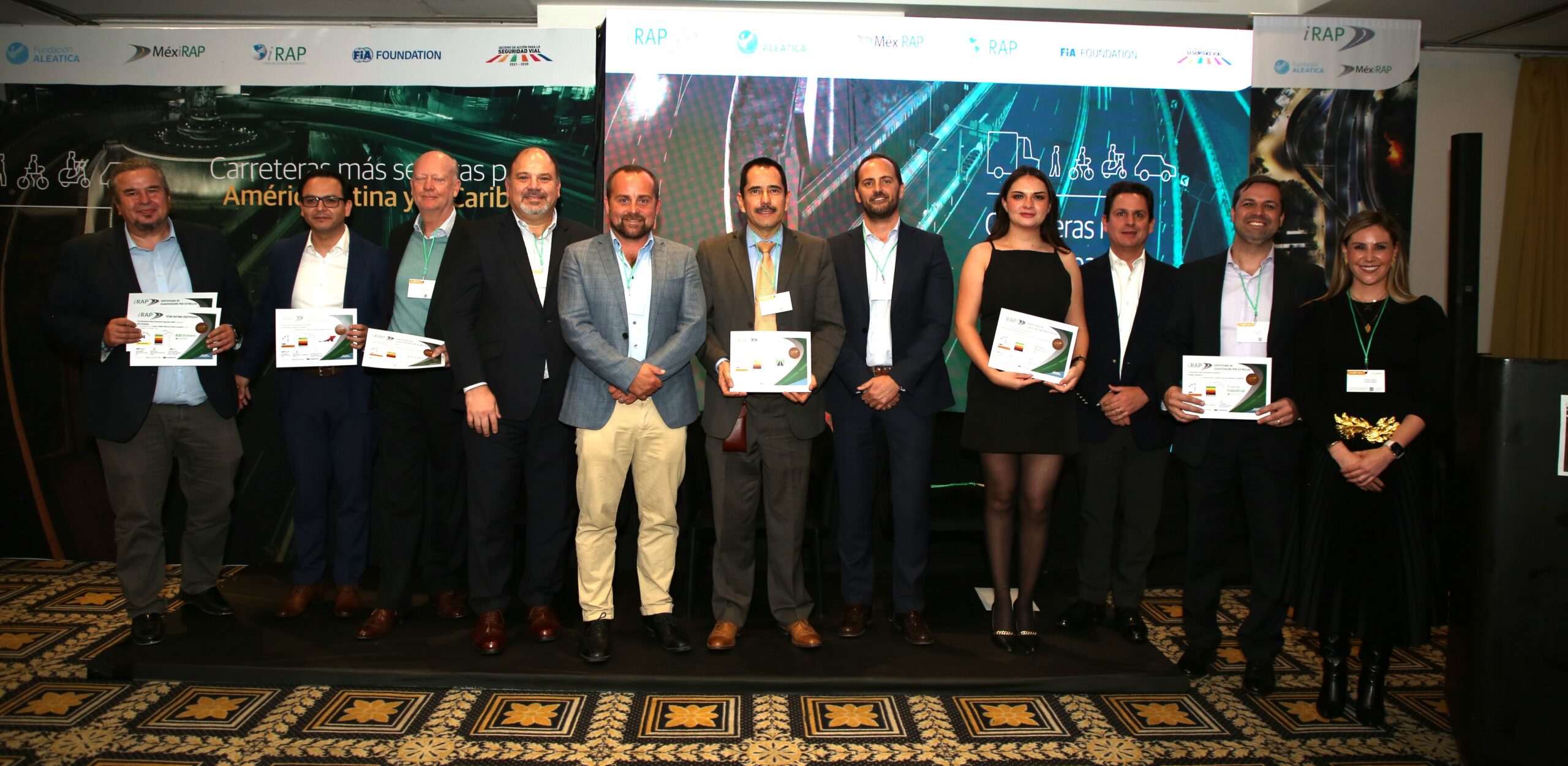
During the event, Aleatica received the iRAP Certification for 8 of its concessions in 4 countries (Mexico, Chile, Spain and Italy) that have achieved the global infrastructure safety standard of three stars or more and signed the global #SaferRoadsPledge affirming its commitment to continue working to ensure that at least 75% of Aleatica’s infrastructure achieve 3-star or better aligned to UN Target 4.
In doing so, Aleatica became the first company to achieve iRAP Certification for multiple assets in multiple countries. Roads in Mexico and Chile are pioneers in the industry in receiving this certificate.
It also joined leading road design, financing and advocacy organisations from 60 countries who have signed the #SaferRoadsPledge, committing to safer roads and mobility by 2030.
David Diaz, Global CEO of Aleatica, commented: ‘Safety on our roads is our top priority as we are committed to contributing to the reduction of fatalities and serious injuries, in line with the United Nations Sustainable Development Goals (SDGs). Today we can proudly say that 8 of our concessions are certified with three stars or more, making us the first company in the industry to achieve this certification for multiple assets in several countries.”
He added: “This compels us to continue working to ensure that at least 75% of Aleatica’s infrastructure achieves three stars or higher by 2030, in line with UN Target 4”.
Read more on Aleatica’s celebrated achievement here.
For more information and to join Aleatica in supporting the #SaferRoadsPledge, visit https://pledge.irap.org/
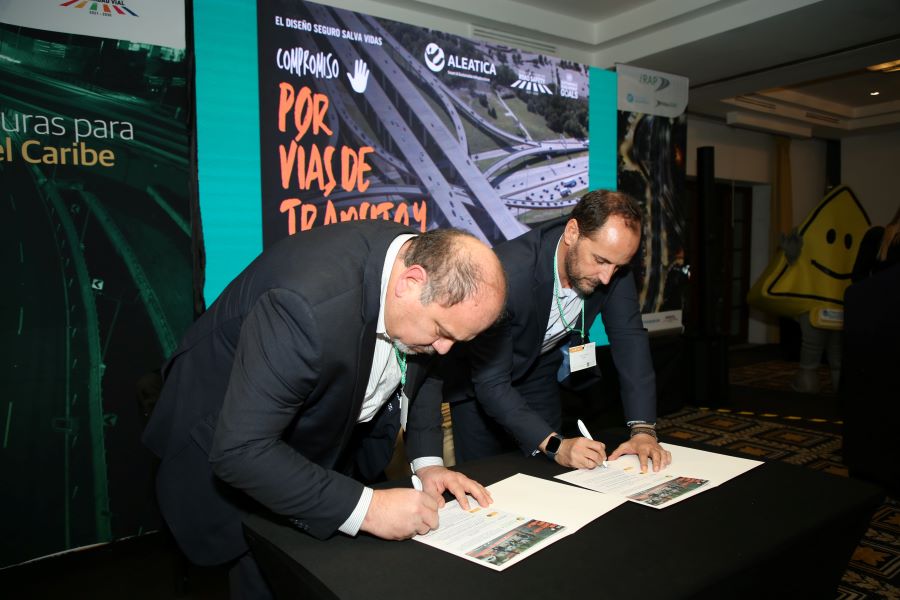
iRAP Safer Journeys Lead for the Americas Edgar Zamora and Aleatica’s Global Director of Road Safety Antonio Pinilla sign the #SaferRoadsPledge
RAP in LAC 2024 enabled important networking and partnerships between stakeholders committed to safe and sustainable transport throughout Latin America and the Caribbean.
Building on partnerships old and new, and invigorated by the successes and opportunities shared, LAC partners’ work now continues, working together for safer mobility in urban and rural environments by 2030.
For more information
- To see how iRAP partners are working to make roads safer in LAC, latest news, and to connect, visit our Latin America and the Caribbean Regional Support page here.
- To discuss how we can support partners with the free tools, training and support to make their roads safer, contact iRAP Safer Journeys Lead for the Americas Edgar Zamora on email edgar.zamora@irap.org
Part of our Regional Event Series
Did you know? Our iRAP Safer Journeys Leads have a strategic focus to support global and national partners to eliminate high-risk roads in the regions – Africa, Europe, Asia Pacific, Latin America and the Caribbean, the Middle East and North America.
We’ve hosted three RAP Regional Events this year focussed on the unique challenges and opportunities for each region to improve road infrastructure safety, policies and partnerships with the goal of halving road deaths and serious injuries by 2030. Read the Europe and Africa regional event summaries here and here.
Read all about our Regional Event Series here.
Images credit: iRAP and Aleatica Foundation for Road Safety

